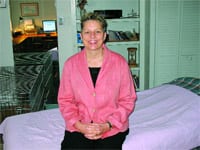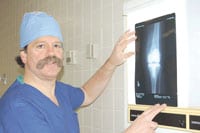The Power of Touch Meet Terri Neal, Massage Therapist to the Elderly
| Terri Neal found her calling more than two decades ago. Well, she stumbled upon it, actually, in a dimly lit room.A former teacher of health and physical education, Neal found a tough job market in education when she moved to Massachusetts in 1982. She eventually landed a job as a recreational therapist at the now-closed Belchertown State School, working with people with developmental disabilities — and it was here that she found an unexpected talent in her own hands.“I’d help them get out of their wheelchairs and put them in beanbag chairs, get them nice and comfortable,” Neal recalled. “I’d turn down the lights, put on soft music, and found myself rubbing their hands, feet, shoulders, and neck. I was amazed at the results in terms of relaxation.
“So I went to massage school.” Now, 20 years later, Neal is still performing massage, as well as leading a team of therapists into largely untapped terrain, building her Amherst-based practice around massage therapy for senior citizens. “The bottom line for me is, if I’m touching someone in an unconditionally caring way, that’s a powerful affirmation of that individual, regardless of state of mind and body,” she said. “They still have value as a whole human being.” It’s a message — and practice — that resonates among Neal’s clients in nursing homes and private-home settings, because, she says, seniors are often largely lacking in the person-to-person touch that everyone craves. “It provides individuals with one-on-one attention, communication, comfort, and support,” Neal told The Healthcare News. “Touching someone in a loving, caring way can provide that nurturing touch that most of us need. Massage therapy can improve one’s self-image and help alleviate depression” — in other words, provide a feel-good experience that is often overlooked in a senior citizen’s life. New Opportunities Although Neal discovered at the Belchertown State School that she enjoyed working with her hands, at the time, she didn’t even realize there was a career called massage therapy. After she received training, she began bringing massage therapy to the homes of the school’s clients, even after the facility closed in 1992. Since then, she has built a private practice in Amherst working with a number of other therapists. “I realized I needed to go into people’s homes,” she said. “So I specialize in house calls for seniors and people with developmental disabilities.” The elderly market, of course, is one that will only expand with the gradual aging of the population and the entry of the Baby Boom generation into the retirement years — that is, once seniors get on board with the idea that it’s a beneficial service. “I definitely believe that tactile stimulation is a form of touch that’s neglected in the aged of our society,” Neal said. “As people age, a number of irreversible and stress-producing things happen to their bodies. They’re going through physical and mental changes, and multiple health problems arise, and physical impairments increase.” At the same time, she noted, they’re faced with the loss of spouses, loved ones, friends, and often their own independence upon entering assisted living or nursing homes. “Some of these individuals do suffer from depression.” Massage therapy, she said, while no cure for any of these ills, promotes relaxation, improves digestion, relieves tension and minor aches, and increases the range of motion in joints, which in turn helps older people stay mobile and active. But what she called the psychosocial benefits may be even more important. “In general, younger people get touched more on a daily basis,” she said. “Seniors may have staff coming in and out and fulfilling basic needs, but a lot of seniors are totally starved for loving, caring human interaction. We see that when people are loved and touched on a regular basis, it lifts their spirits, and they feel better both physically and emotionally.” Branching Out A recent bout with carpal tunnel syndrome has forced Neal to cut back on the amount of private massage she does, but it also spurred her to consider how to better utilize her team of therapists. “A lightbulb went off, and I realized I can grow this business and touch more people,” she said. Massage therapists who make house calls aren’t unheard of, Neal noted, but they usually have to charge more for the travel time. On the other hand, a practice that focuses mainly on the elderly — a population with a large percentage of homebound clients — is a relatively untapped niche in the field, and one she expects to grow. But it has been a slow process. “I’m good with my hands, working one-on-one with people, but marketing myself is a different story.” Still, “I’ve been sending letters to nursing homes talking about how massage therapy will benefit their residents,” she said. “From my perspective, it’s a no-brainer, but they come from a generation that might pay to get their hair and nails done, but massage therapy is seen as a luxury.” Yet, once they experience the benefits, clients tend to want the service on a regular basis, she explained. “One 95-year-old woman told me, ‘nobody has ever touched me except for my husband.’ The number-one part of my job is educating people about what massage is and what it can do for them.” Insurance doesn’t cover massage as a medical treatment, so Neal’s services are usually purchased out-of-pocket. But she has begun to research the possibility of expanding her service through grants. To date, she has made inroads into a few nursing homes, including Mohawk Manor in Shelburne Falls and Quaboag on the Common in West Brookfield, and is actively looking for more opportunities. That’s the Rub Meanwhile, despite the carpal tunnel, Neal appreciates the fact that she has a career that provides so much personal satisfaction. “I love my work,” she said. “I love touching people. It’s a way of communicating with people, and I know it makes them feel better.” |




Comments are closed.